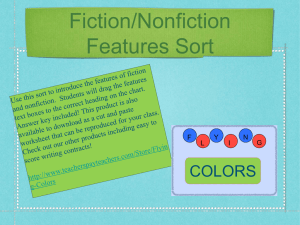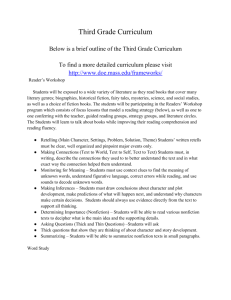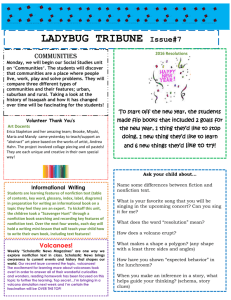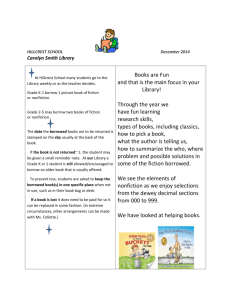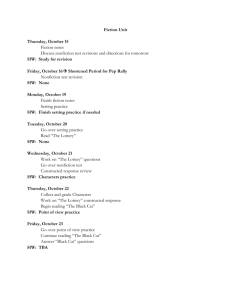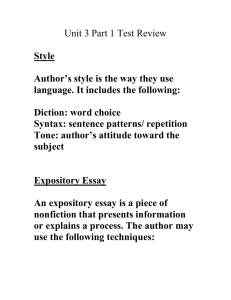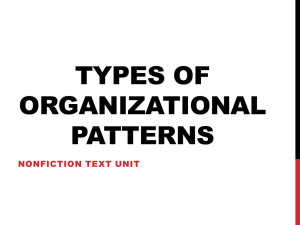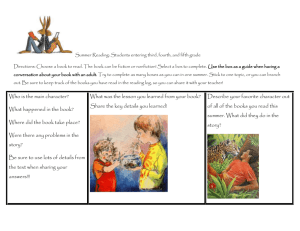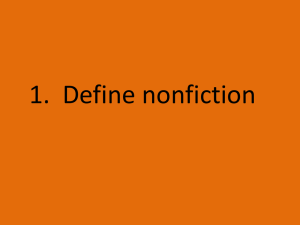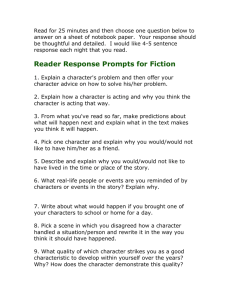English 10 A (Basic): Full Course Summary
advertisement
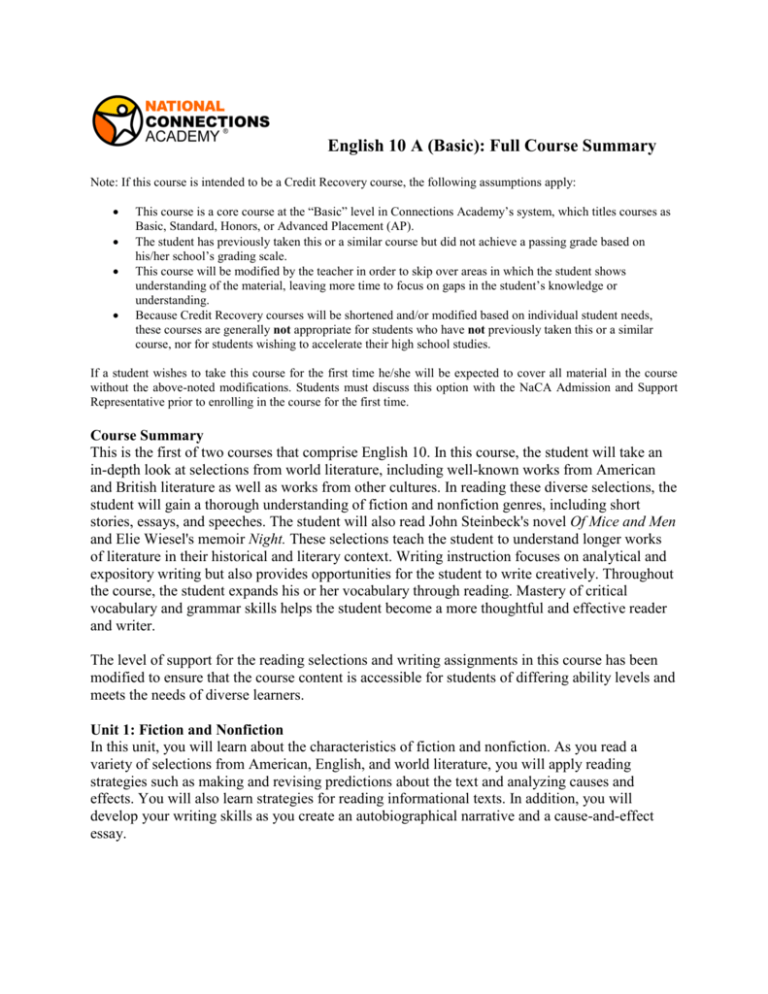
English 10 A (Basic): Full Course Summary Note: If this course is intended to be a Credit Recovery course, the following assumptions apply: • • • • This course is a core course at the “Basic” level in Connections Academy’s system, which titles courses as Basic, Standard, Honors, or Advanced Placement (AP). The student has previously taken this or a similar course but did not achieve a passing grade based on his/her school’s grading scale. This course will be modified by the teacher in order to skip over areas in which the student shows understanding of the material, leaving more time to focus on gaps in the student’s knowledge or understanding. Because Credit Recovery courses will be shortened and/or modified based on individual student needs, these courses are generally not appropriate for students who have not previously taken this or a similar course, nor for students wishing to accelerate their high school studies. If a student wishes to take this course for the first time he/she will be expected to cover all material in the course without the above-noted modifications. Students must discuss this option with the NaCA Admission and Support Representative prior to enrolling in the course for the first time. Course Summary This is the first of two courses that comprise English 10. In this course, the student will take an in-depth look at selections from world literature, including well-known works from American and British literature as well as works from other cultures. In reading these diverse selections, the student will gain a thorough understanding of fiction and nonfiction genres, including short stories, essays, and speeches. The student will also read John Steinbeck's novel Of Mice and Men and Elie Wiesel's memoir Night. These selections teach the student to understand longer works of literature in their historical and literary context. Writing instruction focuses on analytical and expository writing but also provides opportunities for the student to write creatively. Throughout the course, the student expands his or her vocabulary through reading. Mastery of critical vocabulary and grammar skills helps the student become a more thoughtful and effective reader and writer. The level of support for the reading selections and writing assignments in this course has been modified to ensure that the course content is accessible for students of differing ability levels and meets the needs of diverse learners. Unit 1: Fiction and Nonfiction In this unit, you will learn about the characteristics of fiction and nonfiction. As you read a variety of selections from American, English, and world literature, you will apply reading strategies such as making and revising predictions about the text and analyzing causes and effects. You will also learn strategies for reading informational texts. In addition, you will develop your writing skills as you create an autobiographical narrative and a cause-and-effect essay. Lessons 1. Fiction and Nonfiction: Unit Introduction 2. The Monkey's Paw: Day 1 3. The Monkey's Paw: Day 2 4. Swimming to Antarctica: Day 1 5. Swimming to Antarctica: Day 2 6. Comparing Writers' Styles: Hughes/Cisneros 7. Writing Workshop: Narrative 8. Contents of the Dead Man's Pocket: Finney 9. Making History with Vitamin C: Couteur/Burreson 10. The Marginal World: Carson 11. Informational Materials: Technical Articles 12. Comparing Tones: Eco/Mora 13. Fiction and Nonfiction: Unit Review 14. Fiction and Nonfiction: Unit Test 15. Writing Workshop: Cause-and-Effect Essay Unit 2: Short Stories In this unit, you will explore the characteristics of fiction in greater depth by reading and analyzing a variety of short stories. As you read, you will deepen your understanding of literary elements such as plot, conflict, characterization, setting, and theme. Additionally, you will practice strategies that can help you better understand and appreciate the short-story genre, such as making inferences and drawing conclusions. Finally, you will develop your writing skills as you draft a short story and a comparison of two literary works. Lessons 1. Short Stories: Unit Introduction 2. A Visit to Grandmother 3. Writing Workshop: Prewriting for a Short Story 4. The Street of the Cañon: Niggli 5. There Will Come Soft Rains: Bradbury 6. Informational Materials: Web Sites 7. Comparing Points of View: O. Henry/Benét 8. Writing Workshop: Short Story 9. Civil Peace: Achebe 10. The Masque of the Red Death: Poe 11. Informational Materials: Literary Reviews 12. Comparing Irony and Paradox: Narayan/Valenzuela 13. Short Stories: Unit Review 14. Short Stories: Unit Test 15. Writing Workshop: Response to Literature Unit 3: Of Mice and Men Of Mice and Men is the story of two men, George Milton and Lennie Small, living a hardscrabble existence as migrant workers during the Great Depression. Smart and practical, George has spent years looking after Lennie, who is hardworking and kind, but feeble-minded. Each man is the only family the other one has. As George and Lennie move from place to place and job to job, they hope to save enough money to buy a place of their own. Soon their dream seems within reach. But forces beyond their control threaten to ruin their hopes forever. Lessons 1. 2. 3. 4. 5. 6. 7. 8. 9. Of Mice and Men: Lesson 1 Of Mice and Men: Lesson 2 Of Mice and Men: Lesson 3 Of Mice and Men: Lesson 4 Of Mice and Men: Lesson 5 Of Mice and Men: Lesson 6 Of Mice and Men: Writing Workshop Of Mice and Men: Unit Review Of Mice and Men: Unit Test Unit 4: Types of Nonfiction This unit focuses on the characteristics of effective essays and speeches. In this unit, you will read essays and speeches created for a variety of different purposes. These include narratives that communicate the writer's personal experiences, expository writing that explains and informs, and persuasive works that urge readers toward a particular belief or course of action. In addition to analyzing written texts, you will explore the elements that make orally delivered speeches effective. Reading persuasive texts will also guide you in developing your own persuasive writing skills as you compose a brief letter to the editor and a longer persuasive essay. Lessons 1. Types of Nonfiction: Unit Introduction 2. The Spider and the Wasp: Petrunkevitch 3. Informational Materials: Technical Directions 4. The Sun Parlor: West 5. In Commemoration: One Million Volumes: Anaya 6. Comparing Humorous Writing: Twain/Thurber 7. Writing Workshop: Letter to the Editor 8. Keep Memory Alive: Wiesel 9. Nobel Lecture: Solzhenitsyn 10. Informational Materials: Newspaper Editorials 11. The American Idea: White 12. Types of Nonfiction: Unit Review 13. Types of Nonfiction: Unit Test 14. Writing Workshop: Persuasive Essay Unit 5: Night This unit focuses on Night, the memoir of Elie Wiesel's time in a Transylvanian Jewish ghetto and subsequent stays in concentration camps including Auschwitz, Buna, and Buchenwald. In the book, Wiesel recalls his teenage years in 1944–1945 as a Holocaust victim and ultimate survivor. Traveling from camp to camp with his father under German SS rule, Wiesel grapples with issues of faith, loyalty, and basic human survival, both mentally and physically. Lessons 1. Night: Lesson 1: Introduction 2. Night: Lesson 2 3. Night: Lesson 3 4. Night: Lesson 4 5. Night: Lesson 5 6. Night: Lesson 6 7. Night: Lesson 7 8. Night: Writing Workshop 9. Night: Unit Review 10. Night: Unit Test Unit 6: Semester Exam Lessons 1. Semester Review 2. Semester Exam National Connections Academy 1001 Fleet St. 5th Floor Baltimore MD 21202 Toll-free 877-804-NACA (6222) www.connectionsacademy.com/national nacaadvisor@connectionsacademy.com
